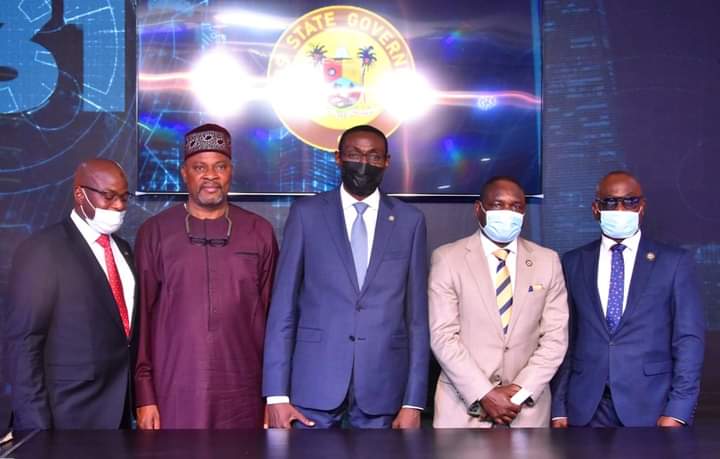
Lagosians got yesterday some cheery news – the funding for the Blue Line Rail project is ready. It will be commissioned alongside the Red Line at the end of next year.
Commissioner for Transportation, Dr. Fred Oladeinde broke the news at a press conference on the achievements of Governor Babajide Sanwo-Olu. It is all part of the Governor’s second year anniversary.
Traffic Management and Transportation is the first pillar of the T.H.E.M.E.S Agenda, the administration’s development plan.
The Blue Line will traverse Mile 2 and Marina. The project, which started in 2013, was temporarily stalled by funding before the Sanwo-Olu administration mounted the saddle.
The Commissioner said construction had fully resumed to complete all outstanding civil works on the Blue Line, adding that the intra-city metro line, which would be powered by an Independent Power Plant (IPP), will be completed with operational infrastructure.
Oladeinde said an efficient transportation system remained the backbone of economic growth, noting that Lagos Government took the courage to simultaneously develop the Blue and Red rail projects to complement land transportation, thereby increasing mobility through an interconnected transportation model.
He said: “Funding has now been secured for the completion of the Blue Line’s civil, operation and management infrastructure. This is major progress for the Blue Line rail project, which spans from National Theatre via Ijora to Marina. This section is a 5.5km elevated rail route that spans over the Lagos lagoon through Ebute-Ero to Elegbata and Marina.
“With the funding available, we are moving towards the construction of the terminal station at Marina. We are stepping up work towards the completion of the installation of palisade fencing along the track, and completion of the continuous beams. An Independent Power Plant (IPP) facility designed for the rail project has commenced”, the Commissioner stated.
He said the Sanwo-Olu administration led an unprecedented investment drive into boosting water transportation, pointing out that the effort had resulted in an increment in ferry services, moving between 5,000 to 10,000 passengers daily.
According to the Commissioner, the Government has opened new routes for ferry operations along Bayeku-Okeiranla-Badore, Ilaje Bariga –Victoria Island–Falomo–CMS and Marina–Ebute Ero.
To fully harness the potential of Lagos waterways for transportation, Oladeinde said the State Government was evaluating proposals from prospective investors, adding that the Ministry would be delivering 15 jetties and more boats to raise the capacity of Lagos Ferry Service (LAGFERRY) to move 75,000 to 100,000 passengers daily.
His words: “The current administration has further facilitated intermodal transportation in Lagos as LBSL collaborates with LAGFERRY to ensure seamless movement of commuters through public transportation. Eight new LAGFERRY boats were commissioned and added to the existing fleet, making a total of 14 boats in the fleet operation. Additional seven high-capacity boats will be added by mid-May to take the total fleet to 21.”
The Commissioner explained how the Government had effectively tackled gridlocks in key traffic-prone spots, stressing that the State had delivered critical roads and flyovers while also embarking on the reconstruction of dilapidated roads and junction improvement to reduce travel time for road users across the metropolis.
Of the 60 gridlock points identified by the Government for remodelling to achieve traffic improvement, 28 have been completed by the Ministry of Transportation, while 22 will be delivered in the coming weeks. 10 gridlock points, the Commissioner said, are at the concept stages.
Oladeinde shared details of the innovative solution initiated by the State Government to ease Apapa gridlock, disclosing that the electronic Call-up System jointly developed with the Nigerian Ports Authority (NPA) had recorded success in ordering movement of heavy-duty trucks in and out of the two seaports in Apapa. The progress, he said, is being sustained with constant monitoring and traffic enforcement by a combined team of the Police and Lagos State Traffic Management Authority (LASTMA).
The Commissioner said the clog being experienced within Apapa was due to activities of oil tankers attempting to access tank farms in the area. He revealed that there was an ongoing discussion between the State Government, Department of Petroleum Resources (DPR), tank farm owners and oil transport workers’ unions to design an e-call up platform that would organise the movement of oil tankers and fully decongest the Apapa corridor.
Other solutions being implemented, according to Oladeinde, include the creation of eight holding bays in different locations across the State to get trailers off the road. This, he said, is being done in collaboration with the NPA.
“We have also initiated the expansion of Asiwaju Bola Ahmed Tinubu (ABAT) Truck Park from 12 hectares to 31 hectares to increase the capacity of the holding bays and accommodate more trucks in the Apapa area,” the Commissioner said.
Earlier, Commissioner for Information and Strategy, Mr. Gbenga Omotoso, said the press briefing was part of the elaborate programme organised to elucidate activities of the Government in the last 24 months, noting that each Ministry would be rolling out its achievements within the period.
Sanwo-Olu and Deputy Governor, Dr. Kadri Obafemi Hamzat, Omotoso said, will be speaking on the administration’s future.












